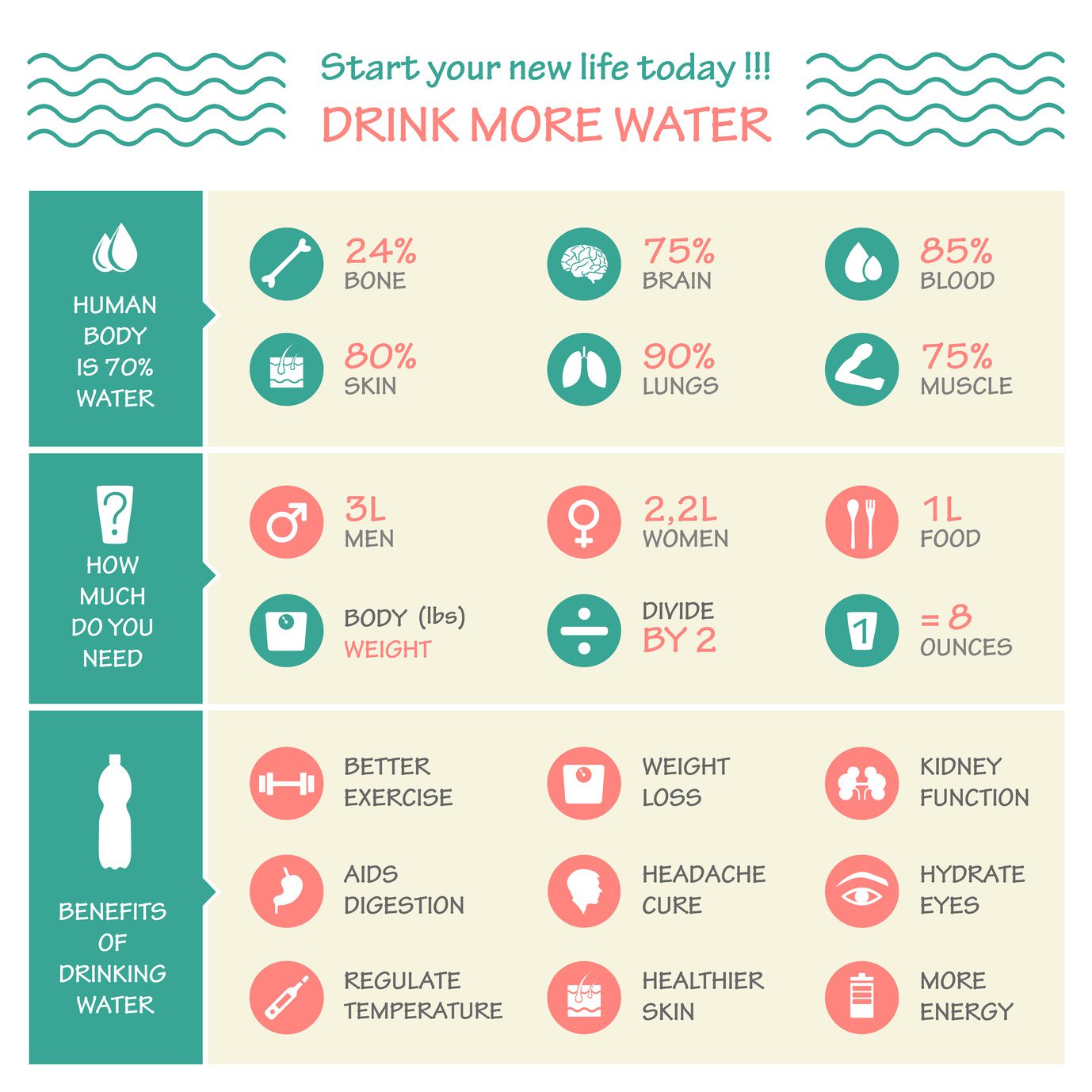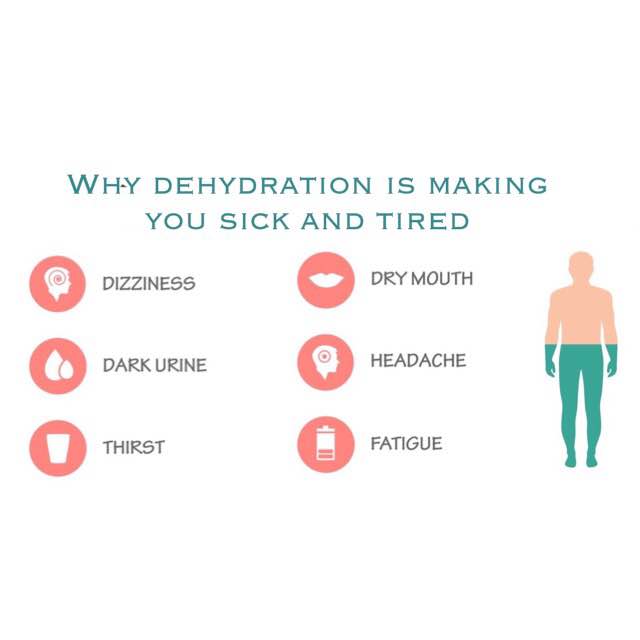A recent news story about an entire family who died of dehydration and hyperthermia brings home the significant dangers of dehydration. If your body lacks fluids, it can’t function properly. Here are ten ways dehydration can make you sick.
The Dangers of Dehydration
Humans can’t live long without water. No wonder. Your body is made of approximately 75% water. Doctors don’t fully understand the total impact of water on chronic diseases and disease prevention, but they know your body needs water to work properly. Hydration is important for things like
- Aiding digestion
- Forming salvia
- Breaking down food
- Moistening your mucous membranes
- Regulate your body’s temperature
- Lubricate your joints and spinal cord
- Keeping the proper pH balance in your body
- Helps your brain produce and use hormones
- Removes toxins out of your cells
- Helps deliver oxygen to your body
- Eliminates waste products

What causes dehydration?
Several things contribute things that contribute to dehydration, such as
- Illnesses: You can get dehydrated from illnesses like gut upsets which cause diarrhea or vomiting.
- Excessive sweating: Exercise, or doing heavy manual labor, can make you sweat and lose fluids.
- Drinking alcohol: Alcohol is a diuretic that reduces the fluids in your body so you get dehydrated.
- Fever
- Not drinking enough water
10 Ways Dehydration Makes You Sick
Here are the consequences of not receiving enough hydration.
1 – Reduced physical endurance
When you exercise, it’s important to maintain your hydration levels. If you aren’t drinking enough water, you may experience reduced endurance, more fatigue, and feel less inclined to be psychically active. Drinking extra water helps eliminate these problems. If you live in a warmer climate, staying hydrated when you’re physically active is important. Exercising in a hot climate without drinking enough fluids can cause low blood pressure and reduced blood flow to your heart and muscles.
It can also cause hyperthermia.
Many people are familiar with hypothermia, but have never heard of hyperthermia. Hyperthermia is when your body gets overheated due to hot weather and being overheated. It causes your body’s heat regulation system to malfunction. Confusion, vomiting, nausea, and rapid breathing are symptoms of hyperthermia.
2 – Poor brain function
Extreme dehydration affects your brain function. You may experience mood changes or a lower cognitive ability resulting in
- Less ability to focus and concentrate
- Less alert
- Short-term memory problems
- Lower perception
Milder dehydration won’t affect your brain function to this level, but in one study, when participants drank extra water, they felt more alert. Individuals who are dehydrated show more brain neuron activity when they’re doing a mental task, which means their brains need to work harder than usual to finish the task.
3 – Delirium
In older people and individuals who are extremely ill, dehydration can lead to delirium and dementia. Older people have a reduced thirst sensation and drink less water compared to younger people. Less fluid intake and the inability to maintain a proper water balance can contribute to this delirium. Other individuals who are at risk for dehydration resulting in delirium include people how have the following:
- Had recent surgery
- People with HIV
- Cancer patients
- People in the hospital
4 – Skin damage
If you’re not getting enough fluids, the blood flow to your skin slows down, causing there to be a decrease in nutrients or oxygen. This affects the way your skin looks and feels. How do you know if your skin is dehydrated? Here’s a quick pinch test.
Pinch a small bit of skin on your chest, back, or hand for a couple of seconds.
- If your skin snaps back after you stop pinching the skin, you’re not dehydrated.
- If your skin stays pinched, you are dehydrated.
- Try the pinch test on other bits of skin again if you want.
Hydration protects your skin. Maintain your fluid levels by doing these things:
- Drink at least eight glasses of water a day
- Drink juices, milk, or herbal teas
- Eat broths and soups
- Fluid-filled fruits and vegetables like melons, strawberries, and lettuce
- Sip healthy green smoothies
5 – Heart attack
Dehydration affects your blood pressure, blood volume, and heart rate. It causes strain on your heart because you have less blood circulating through your body. Your heart beats faster to compensate and you feel heart palpitations. Dehydration thickens your blood and makes your blood vessel walls constrict. This may lead to hypertension and high blood pressure. There will be a buildup of plaque in your arteries which can lead to a heart attack. Thicker blood can also cause you to have blood clots or a stroke.
6 – Joint soreness
If your body lacks fluids, it increases your joint and muscle pain. Hydration of your body keeps the cartilage in your joints pliable and soft. Dehydration pulls fluid out of your muscle tissues, causing you to feel achy and in pain. Increasing how much water you drink can reduce your pain levels and help your joints feel more flexible.
7 – Poor kidney function
Another danger of dehydration is kidney problems. If your body doesn’t have enough fluids, your brain signals your body to conserve water. This slows down the function of your kidneys, reducing your ability to urinate so the waste and toxins linger in your system. There will decrease in the blood that gets sent to your kidneys, so less oxygen and nutrition is being sent to these organs, which results in damage. Kidney damage can be life-altering. Keep yourself hydrated. The recommended amount of daily fluid intake for men is 12 cups of water and 9 cups of water for women. Drinking more doesn’t have an advantage unless you’re trying to get rid of kidney stones.
8 – Low blood pressure
When you’re dehydrated, the water level in your blood is reduced. This causes your heart to pump hard and your blood pressure to drop. If your blood pressure drops too low, your body goes into shock. Shock is a life-threatening condition. Having low blood volume because of dehydration is one of the main causes of shock. Low blood pressure may cause irreparable damage to your heart and other organs.
9 – Feel irritable
Dehydration causes you to feel tired and moody. Loss of water volume in your body affects the way you feel. You lack energy, and can’t think clearly. This contributes to your feeling irritable. It’s thought that your brain senses that you’re dehydrated, affecting your mood. Women are more susceptible than men to these effects of dehydration.
10 – Headaches
Athletes are prone to dehydration because they lose water through sweating. If you’re physically active, you need to drink enough water or you’ll get a headache. A lack of water in your body causes your brain tissue to lose water and shrink away from your skull, which leads to a headache. Water keeps the blood volume high enough for oxygen to flow to your brain. When you’re dehydrated, the blood volume is lowered so you’re not getting enough oxygen. Not having enough fluid in your body will result in your brain tissue shrinking and pulling away from your skull, which results in pain.
What are some other changes to your body because of dehydration?
Dehydration can also cause you to experience other symptoms, such as
- Fatigue and loss of energy
- Dizziness
- Confusion
- Heatstroke
- Stiff joints
- Elevated body temperature
- Swelling of your brain
- Blood pressure changes
- Seizures
How can you fight dehydration besides drinking water?
Drinking water is the primary way to stay hydrated, but there are other things you can do to maintain the fluid levels in your body.
- Use an app to track how much water you drink: Set up an app on your phone to keep track of your water. These apps send you reminders to drink water during your day. You can also record how many glasses of water you drink.
- Smart bottles: You can purchase a smart water bottle to remind you to drink water. There are several types of smart water bottles you can choose from. One of these bottles tracks how much water you drink based on your activity level. Then the bottle lights up to remind you to drink more water. Another one connects to an app on your phone to help you keep track of your water consumption plus reminds you to drink more. There’s one smart water bottle that glows when it’s time to drink water and even plays dance music.
- Freeze your fruit: Skip the popsicle. Instead, freeze your fruits for a sweet, delicious, and healthy snack that will add extra water to your body.
- Eat lots of vegetables: Leafy greens, bell peppers, carrots, and celery are packed with water. Eating these will help you boost your hydration level.

Final Thoughts on the Dangers of Dehydration
Dehydration may not seem like a big deal, but it can be dangerous and even life-threatening. Because your body is primarily made up of water, if you don’t get enough fluids, it affects your entire body, including your heart, brain, and digestive system. Staying hydrated improves your mood, gives you more energy, and helps you stay focused. Dehydration can make you sick and may cause long-term damage. Stay hydrated by drinking enough water, eating water-rich fruits and vegetables.


















